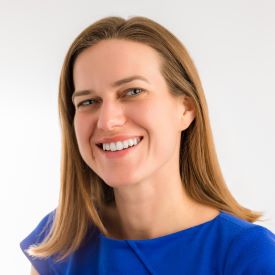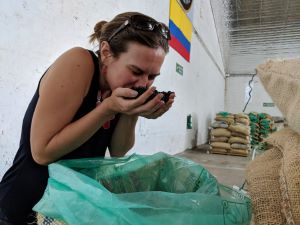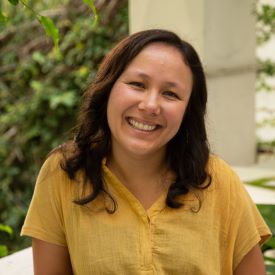Celebrating Start-up Day Across America With Michigan Ross Entrepreneurs

Startup Day Across America, or Congressional Start-up Day, takes place every August. To celebrate and recognize the entrepreneurial and innovative spirit of our alums, we're featuring seven companies founded by or with the help of Ross School of Business graduates.
Even the most seasoned entrepreneurs face challenges when starting a company from scratch. Creating a product, developing and validating a scalable business model, and securing funding are just a few of the tasks entrepreneurs must tackle as they work to get their businesses off the ground.
At Michigan Ross, there are numerous resources available to students seeking to execute their business ideas, particularly through the world-renowned Zell Lurie Institute for Entrepreneurial Studies. Students have the opportunity to practice what they’ve learned in the classroom and invest in one of five student-led investment funds, pitch original business ideas in competitions like the Michigan Business Challenge, and even get connected with resources for their ideas through the Startup Studio.
To learn more about the experience of founding a start-up company and what support students have access to at Michigan Ross, we asked six alum start-up founders to tell us about their experiences starting companies with the help of the U-M community.
 Sulav Singh, MBA ’14
Sulav Singh, MBA ’14
Vittas International, founded by Sulav Singh, is a digital lender transforming healthcare financing in Nigeria. They provide tailored financial solutions that enable healthcare providers to access essential medication, medical supplies, and equipment. Vittas’s mission is to improve healthcare outcomes by reducing the prevalence of counterfeit medication and improving access to quality medical equipment.
Why did you decide to start your own business?
I decided to start Vittas International after my time as a co-founder of Medsaf, a MedTech pharmaceutical company using blockchain technology to bring transparency to healthcare distribution. During my tenure at Medsaf, I witnessed firsthand how financing was a major blocker for healthcare providers. Many clinics and pharmacies struggled to secure the funds needed to purchase quality medications and medical equipment, which would result in substandard care and poor healthcare outcomes.
Recognizing this critical gap, I was inspired to create a solution that would provide tailored financial support to these healthcare providers, ensuring they have the resources necessary to deliver better patient care. I felt this was a high-impact problem. This vision led to the founding of Vittas, where we leverage technology and innovative financial models to transform healthcare financing and improve outcomes in developing markets.
Did you utilize any resources at Michigan Ross to jumpstart your business?
Yes, we have utilized Michigan and Ross in a variety of ways. Off the top of my head, the Zell Lurie Institute Alumni Pitch Competition, ZAM pods, International Transaction Clinic, and Zell Lab for Technologies (UI/UX design support).
Michigan does a great job supporting entrepreneurs on their journey. The four items listed above helped Vittas a lot early on, and this support was invaluable.
What's the hardest challenge you've overcome as a start-up founder?
The hardest challenge I've overcome as a start-up founder has been dealing with constant rejection. In the early days of Vittas, every pitch seemed to end in a "no," and it was incredibly disheartening. Initially, it was tough not to take these rejections as personal attacks on my vision and capability. However, I learned to separate the rejection from my personal identity and see it as an opportunity for growth.
This process involved a lot of learning, iterating, and growing. I realized that while feedback is invaluable, it's crucial to discern which advice to take and which to set aside. Not every suggestion fits every business model, and trying to implement all the feedback can lead to a lack of focus. Over time, I became better at filtering out the noise and honing in on constructive criticism that truly added value to Vittas.
Understanding that rejection is a natural part of the entrepreneurial journey helped me build resilience. It taught me to keep pushing forward, refine our business model, and remain steadfast in our mission to improve healthcare financing. This shift in mindset was transformative and has been instrumental in the progress and successes we've achieved at Vittas.
What advice would you give to aspiring entrepreneurs?
If I could give one piece of advice to aspiring entrepreneurs, it would be to start early. I often wish I had begun my entrepreneurial journey fresh out of college. The sooner you start, the more time you have to experiment, learn, and grow. Starting early gives you the advantage of youth, energy, and often fewer responsibilities, allowing you to take risks and explore different paths.
Additionally, here are a few more pieces of advice:
- Embrace Failure: Understand that failure is an inevitable part of the entrepreneurial journey. Each setback is a learning opportunity. Don’t be discouraged by failures; instead, use them as stepping stones to refine your approach and grow stronger.
- Be Resilient: Entrepreneurship is a marathon, not a sprint. There will be tough times and countless rejections. Resilience is key. Learn to separate rejection from personal worth and keep pushing forward.
- Stay Focused: It’s easy to get distracted by all the advice and feedback you receive. While it’s important to listen, it’s equally crucial to stay focused on your vision. Filter out the noise and prioritize what aligns with your mission and goals.
- Build a Strong Network: Surround yourself with mentors, advisors, and peers who can provide guidance, support, and valuable connections. A strong network can open doors and offer insights that you might not have considered.
- Continual Learning: Stay curious and keep learning. The entrepreneurial landscape is constantly evolving, and staying informed about new trends, technologies, and best practices will help you stay ahead of the curve.
- Customer-Centric Approach: Always keep your customers at the center of your business. Understand their needs, gather their feedback, and continuously improve your product or service based on their input.
- Balance Passion with Pragmatism: While passion drives you, pragmatism ensures you make sound decisions. Balance your enthusiasm with careful planning and data-driven strategies.
Starting early can give you a head start, but regardless of when you begin, these principles will help you navigate the challenges and opportunities of entrepreneurship. Believe in your vision, stay committed, and keep learning and evolving.
 Kait Brown, MBA ’14
Kait Brown, MBA ’14
Savorista, founded by Kait Brown, MBA ’14, crafts delicious decaf and half-caf coffee. Rather than fueling busyness and overcommitment, Savorista’s mission is to ensure that coffee can take its rightful place in your life as something to be savored. Unlike many competitors, who use harsh chemicals in the decaffeination process, Savorista decaffeinates its coffee using natural ingredients and methods.
 Why did you decide to start your own business?
Why did you decide to start your own business?
I was working very intense hours at a time when my father was battling cancer. I found that caffeine was amplifying my stress and preventing me from sleeping. I switched to decaf because I couldn't imagine giving up coffee, but I was very disappointed with the decaf options out there. They didn't taste good, and most were decaffeinated with harsh chemicals.
I realized there are many other coffee lovers who want more coffee with less caffeine, and they want it to taste great and be decaffeinated with natural ingredients. I started Savorista for caffeine-conscious coffee lovers like myself.
Did you utilize any resources at Michigan Ross to jumpstart your business?
So many great ZLI resources! I've found the Alumni Summit to be particularly valuable and also appreciated a marketing for start-ups virtual workshop series. The Zell Alumni Mastermind group has also been extremely impactful for me. My group started together a few years ago and call each other our ZAM Fam. We meet regularly and support each other through various business, team, and life challenges.
 What's the hardest challenge you've overcome as a start-up founder?
What's the hardest challenge you've overcome as a start-up founder?
One challenge is managing your own emotional journey alongside the startup's evolution. Wins for your startup feel extra fantastic, and low points feel even lower. Finding your own way to build through a startup's unpredictability without being on an emotional rollercoaster is so important.
What advice would you give to aspiring entrepreneurs?
Determine early on who you need on your team to build the business that can achieve your goals and figure out how to get them involved as early as possible.
 Jack Griffin, BBA ’19
Jack Griffin, BBA ’19
FoodFinder, founded by Jack Griffin, BBA ’19, is a national nonprofit organization that helps hungry families find and get help from their closest food pantries. Its website and app act as food pantry locators, showing users when and where to get free food assistance in their area.
Why did you decide to start your own business?
In high school, I tried and failed to find a food pantry to volunteer at by searching online. Once I realized how inaccessible information on emergency food aid is online, I decided to solve that problem for struggling families who were also searching for these programs.
Did you utilize any resources at Michigan Ross to jumpstart your business?
I utilized a ton of resources at Ross! The Zell-Lurie Institute, Michigan Business Challenge, and Dare to Dream grants all helped FoodFinder grow in its early years.
What's the hardest challenge you've overcome as a start-up founder?
Self-doubt.
What advice would you give to aspiring entrepreneurs?
If there's an idea or problem you can't stop thinking about, start bringing it to life however you can! No matter how small that first step may be, it might grow into something extraordinary.
 Carlotta Pham, MBA/MS ’22
Carlotta Pham, MBA/MS ’22
Carlotta Pham, named after its founder, is a professional services company that specializes in designing and facilitating custom gatherings to transform how groups collaborate on society’s complex challenges. Through half-day workshops, multi-day workshops, and retreats, Carlotta Pham aims to assist organizations struggling with cross-functional collaboration, group identity, values, goals, and more.
Why did you decide to start your own business?
I stumbled into entrepreneurship during my graduate studies at U-M. I came here to pivot my career into sustainability. As a student of the Erb Institute for Global Sustainable Enterprise, I learned that the intersection of business and sustainability is highly complex and requires navigating many dimensions — social, environmental, economic, cultural, and political. As a facilitator for U-M’s Center for Socially Engaged Design, I saw the potential for designing and facilitating workshops that could elevate collaboration and action among multi-stakeholder groups to work on these complex sustainability challenges. I desired to take what I was learning from these experiences to support organizations, communities, and people in addressing their challenges.
In my final year of graduate school, I was struggling to find job opportunities that would blend the areas that I was passionate about and leverage my strengths. A mentor, Dr. Steve Skerlos, asked, “Have you thought about starting your own thing?” My immediate answer was no, as I considered myself highly risk-averse. But the more I thought about it, the more I realized that I hadn’t considered the risk of feeling unfulfilled in what I was doing professionally. A way for me to manage that ‘fulfillment risk’ was to create what I wanted for myself through an entrepreneurial pathway. By the time I graduated, I was convinced to take the leap and become an entrepreneur.
It has been an incredible learning experience. I have gotten to apply many of the concepts that I learned as a student in business and sustainability, and it has added immense fulfillment to my life.
Did you utilize any resources at Michigan Ross to jumpstart your business?
The ZLI Alumni Masterminds Group program, the Alumni Summit, guidance from the amazing Drea Shipp-Caldwell at ZLI, who helped me navigate my entrepreneurial journey, and the supportive network of many Michigan Wolverines (staff, professors, alums, and students).
 What's the hardest challenge you've overcome as a start-up founder?
What's the hardest challenge you've overcome as a start-up founder?
Overcoming those pesky mental gremlins that ask, “Can I actually make this work?” I’m still working on this challenge and perhaps always will be. Over time I have noticed that I’ve built confidence and designed structures and routines to better equip me when these gremlins show up. Some of the more impactful changes I’ve made have been:
- Being a solo-preneur can sometimes be lonely, but I have found deep connection and camaraderie in meeting regularly with other entrepreneurs and through my client/partner relationships. They have helped me through the ups and downs.
- When I was unsure whether this venture would be financially viable, I set up my business financial system to give me visibility into my company's financial stability and drive my financial decision-making.
- At this moment, just shy of two years into my business, I’m realizing how important it is to be patient with myself because building a business takes time.
What advice would you give to aspiring entrepreneurs?
Bet on yourself! Believe that you have something valuable to offer this world, and go out and authentically make it happen. Bring others along on your journey, whether that is through coffee chats, mentorship, coaching, requests for support, formal programs, social media, etc. Entrepreneurship isn’t a journey that you need to do alone and there are many people who are also willing to bet on and support you. If you’re looking for encouragement, feel free to reach out to me.
 Natalie Fang, MBA ’20
Natalie Fang, MBA ’20
Nochi Studios, founded by Natalie Fang, MBA ’20, publishes video games for female gamers and empowers female creators to develop games. The studio is proudly female-founded and run, with a diverse team dedicated to combining the creativity of indie-developed games with the professionalism of a large studio.
Why did you decide to start your own business?
When the business was created, there weren't enough games for female players in the United States, and the ones that were available were problematic in content — especially in light of the #MeToo movement — as these female-targeted games were created by publishers in Asia with male directors and writers.
Did you utilize any resources at Michigan Ross to jumpstart your business?
I participated in every ZLI program that I could to learn and practice entrepreneurial skills, including participating in two of the student venture funds, the Dare to Dream program, the Michigan Business Challenge, and more.
What's the hardest challenge you've overcome as a start-up founder?
Building a strong, fun team culture for remote work. It's a lot easier to build relationships through in-person work culture, like coffee breaks or happy hours that come up randomly. So, to energize the team and still feel connected day-to-day, I'm constantly thinking of intentional remote equivalents and switching things up so it doesn't feel stale or inorganic.
What advice would you give to aspiring entrepreneurs?
Find a supportive community and mentors! It helps so much to learn from others, share challenges, and even commiserate when something tough comes up. You may discover a solution or point of view that you haven't considered before, and it can be enlightening.
 Heath Silverman, MBA ’08
Heath Silverman, MBA ’08
Stessa, co-founded by Heath Silverman, MBA ’08, is a platform for real estate investors to track, manage, and optimize their holdings. Hundreds of thousands of landlords use Stessa today for accounting, tax prep, banking, online rent collection, leasing, and screening for more than $100 billion in assets.
Why did you decide to start your own business?
I knew from a young age that I enjoyed building things, and as a multiple-time founder, I love the process of creating, growing, and scaling businesses. Stessa seemed inevitable as I spent 20 years both working in tech and investing in real estate as a hobby. It became very clear there was a big opportunity to bring the two together and automate a lot of the busy work that comes with being a real estate investor. Real estate is a great tool for wealth generation, yet many individual investors have no clue if they are making or losing money. Enter Stessa, with dashboards and alerts that provide real-time insights to help owners maximize returns and run their investments like a business.
Did you utilize any resources at Michigan Ross to jumpstart your business?
Michigan Ross has been an integral part of my entrepreneurial journey with Stessa. A couple of my Ross colleagues were advisors during the early days of the business, and a classmate provided our first office. From attending a ZLI Alumni Entrepreneurs Summit, where I got to network with other early-stage founders and participate in group workshops, to bringing on a summer MBA intern through ZLI’s Marcel Gani Internship Program, we took full advantage of numerous ZLI resources.
What's the hardest challenge you've overcome as a start-up founder?
Starting a business is hard, and there are endless mental, financial, operational, and strategic challenges that continue to evolve as the business matures. One of the biggest challenges that I continue to think about daily is product-market fit. As Stessa is self-service software that relies heavily on product-led growth, having a strong product-market fit and staying ahead of the competition is always top of mind.
There were a number of skeptics when fundraising in the early days, and there were similar doubts when launching our first premium subscription offering. In the end, staying focused on customer needs, developing strong feedback loops across product/success/marketing, and being incredibly data-driven as we executed have resulted in us building a successful product that customers truly love.
What advice would you give to aspiring entrepreneurs?
Bring together a strong team and stay resilient. Nothing comes easy, and everything takes longer than expected. Building a business is a long slog, and you can’t do it alone. Many days, weeks, and even months pass where you are deep in the details and it may feel like little is happening, but you need to power through and believe in the vision and the process. When you finally take a step back and look at what has been accomplished, it is always incredible to see just how far you have come.
 Crystal (Williams) Brown, BA ‘10
Crystal (Williams) Brown, BA ‘10
CircNova, co-founded by Crystal Brown, BA ’10, is an AI-driven drug discovery platform and product development “deep” biotech start-up. The company is dedicated to advancing programmable medicine based on non-coding RNA therapeutic development, specifically targeting undruggable medical needs.
Why did you decide to start your own business?
I helped co-found CircNova because I knew I had a unique perspective that would allow me to identify and understand market needs that others may overlook.
Did you utilize any resources at Michigan Ross to jumpstart your business?
CircNova partnered with the U-M Center for RNA Biomedicine on research efforts. The relationship was fostered by esteemed U-M faculty members Nils Walter and Lydia Freddolino, who are both advisors to the company.
What's the hardest challenge you've overcome as a start-up founder?
Balance. Being a start-up founder requires total commitment. As a mother, wife, daughter, etc., I have to be intentional with my time. It’s easy to become consumed with all things start-up. One of the most challenging aspects of being a founder is remembering there are only 24 hours in a day, and your start-up cannot have every hour. You must balance so you don’t lose sight of why you started this journey in the first place.
What advice would you give to aspiring entrepreneurs?
As a start-up founder, you must have relentless intrinsic motivation. At the end of the day, nobody is calling to make sure you put in as much effort as possible to progress your company forward. You have to find your “why” for yourself and then find others who have the same level of passion behind their own “why.” Once you have a collected group of individuals who have aligned motives, vision, and goals, you’re on your way.




